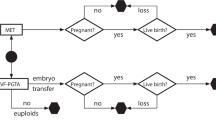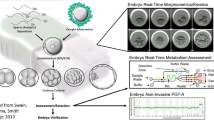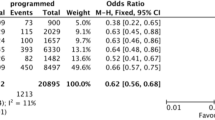Abstract
Purpose: Following preimplantation genetic diagnosis of aneuploidy, embryo transfer was executed on day 4, with the aim of providing more time for expanding from six to nine the number of diagnosed chromosomes per single cell (Group 2; 45 cycles). The results obtained were compared to those derived from conventional day 3 transfer (Group 1; 71 cycles).
Methods: For multicolor fluorescence in situ hybridization analysis, two panels of probes were used: the first, specific for chromosomes XY, 13, 16, 18, and 21, was tested in all patients (Groups 1 and 2); the second was implemented only in Group 2 patients for the detection of chromosomes 14, 15, and 22.
Results: A total of 406 embryos underwent fluorescence in situ hybridization analysis in Group 1, and 236 in Group 2. Comparable percentages of both chromosomal abnormalities (61% and 62%) and pregnancy and implantation rates (36% and 24.5% in Group 1, 41% and 23.6% in Group 2) resulted, regardless of the higher mean age in Group 2.
Conclusions: The diagnosis of the nine chromosomes which are most frequently associated with aneuploidy in humans could have an immediate impact on the rate of spontaneous abortions. Additional advantages are represented by the more accurate morphological evaluation of euploid embryos; the advanced compaction, which means that embryos are less exposed to damage during the transfer procedure; and the possibility of performing a reanalysis in cases where a fluorescence in situ hybridization diagnosis is not obtained.
Similar content being viewed by others
REFERENCES
Plachot M, Mandelbaum J: Oocyte maturation, fertilization and embryonic growth in vitro. Br Med Bull 1990;46:675-694
Delhanty JDA, Griffin DK, Handyside AH, Harper J, Atkinson GH, Pieters MH, Winston RM: Detection of aneuploidy and chromosomal mosaicism in human embryos during preimplantation sex determination by fluorescent in situ hybridization (FISH). Hum Mol Genet 1993;2:1183-1185
Munné S, Alikani M, Tomkin G, Grifo J, Cohen J: Embryo morphology, developmental rates and maternal age are correlated with chromosomal abnormalities. Fertil Steril 1995;64:382-391
Verlinsky Y, Cieslak J, Freidine M, Ivakhnenko V, Wolf G, Kovalinskaya L, White M, Lifchez A, Kaplan B, Moise J, Valle J, Ginsberg N, Strom C, Kuliev A: Polar body diagnosis of common aneuploidies by FISH. J Assist Reprod Genet 1996;13:157-162
Gianaroli L, Magli MC, Munné S, Fiorentino A, Montanaro N, Ferraretti AP: Will preimplantation genetic diagnosis assist patients with a poor prognosis to achieve pregnancy? Hum Reprod 1997;12:1762-1767
Gianaroli L, Magli MC, Ferraretti AP, Fiorentino A, Garrisi J, Munné S: Preimplantation genetic diagnosis increases the implantation rate in human in vitro fertilization by avoiding the transfer of chromosomally abnormal embryos. Fertil Steril 1997;68:1128-1131
Magli MC, Gianaroli L, Munné S, Ferraretti AP: Incidence of chromosomal abnormalities from a morphologically normal cohort of embryos in poor-prognosis patients. J Assist Reprod Genet 1998;15:297-301
Ferraretti AP, Magli MC, Feliciani E, Montanaro N, Gianaroli L: Relationship of timing agonist administration in the cycle phase to the ovarian response to gonadotropins in the long down-regulation protocols for assisted reproductive technologies. Fertil Steril 1996;65:114-121
Munné S, Lee A, Rosewaks Z, Grifo J, Cohen J: Diagnosis of major chromosome aneuploidies in human preimplantation embryos. Hum Reprod 1993;8:2185-2191
Munné S, Marquez C, Magli C, Morton P, Morrison L: Scoring criteria for preimplantation genetic diagnosis of numerical abnormalities for chromosomes X, Y, 13, 16, 18 and 21. Mol Hum Reprod 1998;4:863-870
Munné S, Weier U: Simultaneous enumeration of chromosomes 13, 18, 21, X and Y in interphase cells for preimplantation genetic diagnosis. Cytogenet Cell Genet 1996;75:263-270
Grifo JA, Giatras K, Tang YX, Krey LC: Successful outcome with day 4 embryo transfer after preimplantation diagnosis for genetically transmitted diseases. Hum Reprod 1998;13:1656-1659
Menezo Y, Hazout A, Dumont M, Herbaut N, Nicollet B: Co-culture of embryos on Vero cells and transfer of blastocysts in humans. Hum Reprod 1992;Suppl 1:101-106
Dawson KJ, Conaghan J, Ostera GR, Winston RM, Hardy K: Delaying transfer to the third day post-insemination, to select non arrested embryos, increases development to the fetal heart stage. Hum Reprod 1995;10:177-182
Jones GM, Trounson, AO, Gardner DK, Kausche A, Lolatgis N, Wood C: Evolution of a culture protocol for successful blastocyst development and pregnancy. Hum Reprod 1998;13:169-177
Magli MC, Fortini D, Gianaroli L, et al.: Performance of thawed biopsied embryos. In Abstracts from the 14th ESHRE Meeting. Hum Reprod 1998;13:131 (abstr R-119)
Author information
Authors and Affiliations
Rights and permissions
About this article
Cite this article
Gianaroli, L., Magli, M.C., Munné, S. et al. Advantages of Day 4 Embryo Transfer in Patients Undergoing Preimplantation Genetic Diagnosis of Aneuploidy. J Assist Reprod Genet 16, 170–175 (1999). https://doi.org/10.1023/A:1020356605408
Issue Date:
DOI: https://doi.org/10.1023/A:1020356605408




